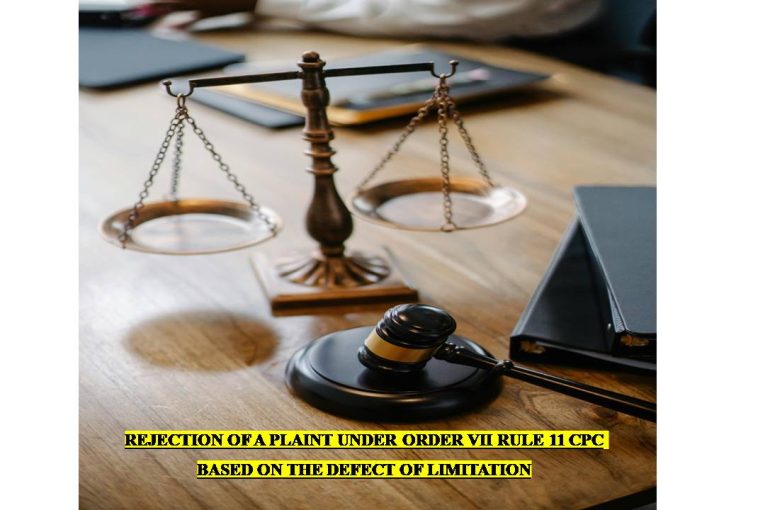REJECTION OF A PLAINT UNDER ORDER VII RULE 11 CPC BASED ON THE DEFECT OF LIMITATION
 The Hon’ble Supreme Court in the matter of Smt. Uma Devi and Ors. vs. Sri. Anand Kumar and Ors. (Special Leave Petition (Civil) No. 2137 of 2025) recently examined the question of limitation with respect to Plaint being rejected. The Court had laid it’s emphasis on deciphering the appropriate point of time from where the prescribed period begins, i.e., the starting point for the limitation period when a Plaint is rejected under Order VII Rule 11 of the Code of Civil Procedure, 1908.
The Hon’ble Supreme Court in the matter of Smt. Uma Devi and Ors. vs. Sri. Anand Kumar and Ors. (Special Leave Petition (Civil) No. 2137 of 2025) recently examined the question of limitation with respect to Plaint being rejected. The Court had laid it’s emphasis on deciphering the appropriate point of time from where the prescribed period begins, i.e., the starting point for the limitation period when a Plaint is rejected under Order VII Rule 11 of the Code of Civil Procedure, 1908.
The said case is a dispute of civil nature regarding an ancestral property for which the Appellants had filed a suit seeking partition of the said ancestral property. Here, the Plaintiffs and the Defendants therein belong to the same larger family. After perusing the evidence at hand, with respect to the timeline of the matter, it was at the Trial Court level itself that the Plaint was rejected under Order VII Rule 11 CPC for want of limitation.
The Appellants contended that the suit was within the prescribed limitation period and challenged the rejection of their Plaint before the High Court, wherein the High Court found that there were issues which were required to be adjudicated upon. Further, the Court held that the Plaintiffs therein had a valid claim over the said ancestral property. Also, as there was no specific notice regarding the partition, the Court decided to remand the matter back to the Trial Court. Subsequently, the matter reached the Supreme Court.
Issues:
- Whether the period for limitation for filing a suit for partition begins from the date of knowledge of the deed or another relevant date?
- Whether the trial court correctly rejected the Plaint on the grounds of limitation, considering the facts and circumstances of the case?
Analysis and Conclusion:
The judgment highlights that rejection of the Plaint due to limitation can occur at an early stage in the proceedings, especially when it is clear from the face of the Plaint that the suit is time-barred. However, if there is ambiguity or if further clarification is needed, the court can allow the plaintiff an opportunity to explain or produce evidence regarding the limitation period.
The Supreme Court has discussed various other judgements wherein emphasis was laid on scope of Order VII Rule 11 of the CPC. With the principle of law that registration of a document implies that it is in public knowledge, the Supreme Court came to a conclusion that the predecessors of the Plaintiff had notice of the registered sale deeds and thus held that the plaintiffs cannot reignite their rights after sleeping upon them for 45 years. The argument of the Plaintiffs that the prescribed period for limitation would start from 2023, for it being the time when the said deeds came into their knowledge was rejected by the Apex Court.
Ultimately, the Court held that the Trial Court was correct while allowing the application of the Defendants therein under Order VII Rule 11. It also observed in the Order that the Plaintiff’s suit was a meaning less litigation and it had failed to show any valid cause of action and was barred by limitation. The Court also recorded that the High Court lacked any justifiable reason to remand the matter back to the Trail Court. Hence, the suit being barred by limitation, the impugned order of the High Court was thus set aside.
SARTHAK KALRA
Senior Legal Associate
The Indian Lawyer and Allied Services
Please log on to our YouTube channel, The Indian Lawyer Legal Tips, to learn about various aspects of the law. Our latest video, titled Everything You Need to Know About Property Gift Deeds‘, can be viewed at the link below:
https://youtu.be/w4SdbYPfXyg?si=xEZsWesV-uM8Rc7u





































Leave a Reply